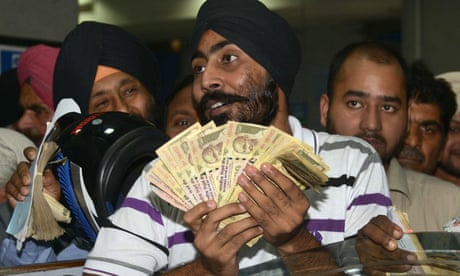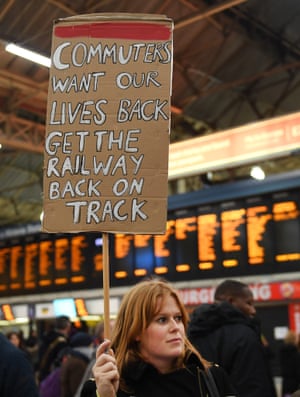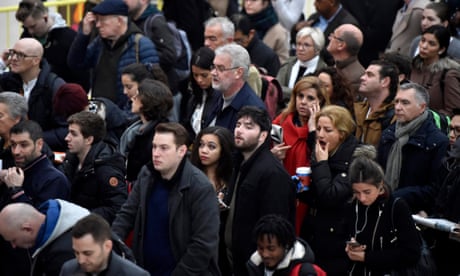Down one of the hundreds of dusty lanes that make up Gandhi Nagar market, Delhi’s largest textile bazaar, the small factory where Neeraj Sharma produces girls’ jeans is quiet.
“Normally you couldn’t walk in here,” he says, ambling across the concrete shop floor, past dormant sowing machines and piles of unfinished denim.
Sharma estimates around 80% of his workforce have left Delhi for their villages in the past month. “It’s good that they left,” he adds. “Because of this demonetisation problem, there’s no work for us either.”
India’s vast informal economy has been reeling since 8 November, the morning after India’s prime minister, Narendra Modi, announced the sudden voiding of the country’s two most-used cash bills.

Your money's no good: rupee note cancellation plunges India into panic
It is the largest-scale financial experiment in Indian history: gutting 14 trillion rupees – 86% of the currency in circulation – from the most cash-dependent major economy in the world.
More than a month on, India’s Reserve Bank has issued around 1.7 billion new notes, with less than one-third the value of what was removed. The sixth-largest economy in the world is running on 60% less currency than before. Lines outside banks continue to stretch, and India’s small business lobby says its members are facing an “apocalypse”. But Modi insists he isn’t done.
Initially intended to flush out the “black money” said to be hoarded by elites and criminals, the government now frames demonetisation as the first step in a “cashless” revolution to shift the billions of transactions undertaken each day in India online – and onto the radar of tax authorities.
This week, labour minister Bandaru Dattatreya announced it would soon be mandatory for employers to pay their staff into bank accounts, a hugely ambitious step in a country where as many as 90% of workers are paid in cash.
Already struggling, businessmen such as Sharma are dreading the prospect of more enforced digital migration.
“How do you think I can pay the workers with a cheque if they don’t have a bank account?” he asks, in a tiny office thick with incense smoke. “And it takes three days to clear a cheque. What will they eat during those days?”
His reasons are not just altruistic. Apart from potentially raising his tax bill – in a country where just 1% pay income tax – paying salaries electronically would mean giving staff Delhi’s mandated minimum wage, currently 9,724 rupees (£114) per month for unskilled workers.
“Right now no one pays the minimum wage that the government decides,” Sharma says. “It will only make things expensive: we will charge the customer.”
Outside his workers’ earshot, he adds: “If someone is doing the work of Rs.2000, why should we pay them Rs.15,000?”
But workers too are wary of the big push online. Tens of millions of Indians have been given zero-deposit bank accounts in the past two years under a government scheme to boost financial inclusion. But even after demonetisation prompted a rush of new deposits, 23% of the accounts still lie empty.
Asha Devi sits spread-legged on the Sharma factory’s floor, using fine scissors to cut loose threads from piles of jeans. A migrant labourer from Bihar state, she has a bank account, but has not been able to access her money since early November.
“I’ve been standing in [bank] queues from 7am until 5.30 in the evening,” she says. “I still cannot withdraw money, and I lose a day of work each time.”
The experience has heightened her scepticism about being paid online. “I am a daily wage worker and I’m not sure if I’ll have a job tomorrow,” she says. “If I get [the cash] in hand, I know I have the money.”
Cash has a cold, hard certainty that still matters to itinerant workers. “There are many factory owners who will make these daily wage workers into fools,” Devi adds. “They’ll tell them they have deposited the money when they haven’t.”
“In theory, it’s a great idea to actually ensure that workers actually get the wage they’ve been promised,” says Aparna, the president of the Indian Federation of Trade Unions, who like many Indians uses only one name.
“The downside is: we can’t do it. It’s a bit like say the government has announced the end to all poverty by tomorrow. It’s not taking into account any of the obvious constraints that even a child in India could see.”
Around one in three Indians still don’t have bank accounts, she says, many of them put off by the need to navigate banking bureaucracy. “For people who don’t have matching identity cards – say, if somebody made a mistake typing their name – then it’s a nightmare,” she says.
Nagendra Sarkar, another of Sharma’s employees, has been trying to open an account in Delhi, but keeps running into an obstacle: he has no fixed address. “The bank people are asking for papers to prove that it’s my account,” he says.
It is one of many points at which the digital salary plan, and the entire “cashless” vision, butt up against the stubborn reality of Indian working life.
“Take an example of rickshaw puller who transfers goods from my shop to the factories,” says Pyarlal, a lace factory owner in Gandhi Nagar.
“For one trip I pay him 100 rupees. Does the government expect me to give him a cheque? I mean, how do I pay him?”
Such a major reform, even one that might benefit workers, can’t be enforced overnight, Aparna says. “You have to do it gradually, let the system be put in place, create the infrastructure first.”
Mihir Sharma, a senior fellow at the Delhi-based Observer Research Foundation, agrees. “The law might well be passed,” he says. “But it would likely be widely ignored, which is the fare of most labour regulation in India.”
Digital payments might be novel, but the ambitious plan is “an old Indian pathology”, he says. “The belief that if you legislate something, it happens.”


